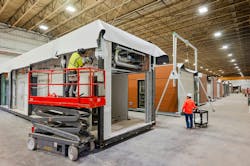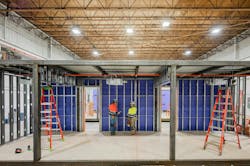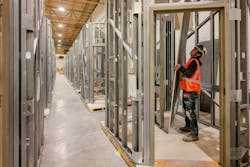Boldt Group launches modular/prefab manufacturer
Wisconsin-based The Boldt Group, a general contractor and manufacturer with 18 offices nationwide, has launched a modular and prefabrication company called Bildt that makes and installs buildings, rooms and panels at the company’s off-site facility in Oshkosh, Wis.
Leading Bildt are Melanie Taylor, a 20-year Boldt associate who is currently its Vice President of Manufacturing; and Ben Bruns, a five-plus-year company vet who, as Vice President of Modular, will oversee Bildt’s sales and marketing.
Boldt states that it created Bildt in response to its customers’ competitive need to reduce project costs and to complete those projects faster. Bruns, in a prepared statement, estimates that, in some cases, Bildt’s first costs would be 30% less than comparable site-built construction.
Making the leap
Boldt has been flirting modular and prefabrication since the 1980s. It made headlines during the recent Covid pandemic when, with the design firm HGA, created STAAT MOD, modular additions to hospitals that, at the time, were struggling to meet the need for more patient beds.
Bildt makes permanent modular buildings and slide-in room and bathroom pods for building types that include healthcare, industrial, education, and commercial. It also prefabricates panels and components that include headwalls, exterior panels and systems, steel wall studs, and customizable interior framing assemblies.
“Collaborating with designers and other stakeholders early in the process allows us to customize and deliver precision-engineered products to meet each project’s goals,” said Taylor.
Bildt’s team also completes any final construction and MEP tie-ins, and can prepare new facilities for occupancy.
While its main target market appears to be healthcare, Bildt envisions a broader assortment of building types for which its approach could be applied, including everything from substance abuse treatment clinics to EV charging depots.
About the Author

John Caulfield
John Caulfield is Senior Editor with Building Design + Construction Magazine.


